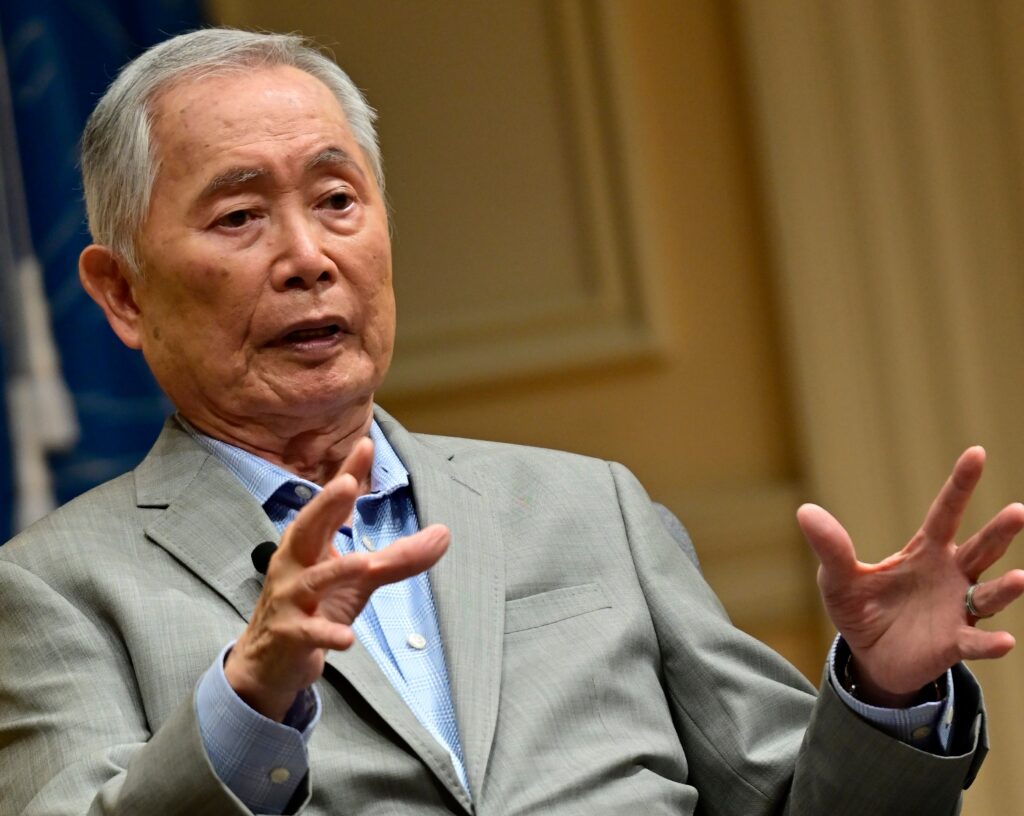When he was five years old, George Takei was incarcerated with his family in a camp with thousands of other Japanese Americans.
“I’ve told this story many, many times. It is an important chapter of American history,” said Takei during a Zoom call. “But it always takes me by surprise whenever I talk about my childhood imprisonment. People are shocked that this actually happened.”
Takei was referring to the incarceration of Japanese Americans after the bombing of Pearl Harbor in 1941. That unleashed a tsunami of anti-Japanese sentiment, which swept over the nation and unjustly sent 120,00o Japanese Americans to concentration camps.
“We were accused of being enemy aliens and had everything taken away from us except for some clothing,” said Takei. “We ended up segregated at Tule Lake in California, which had a boundary of barbed wire, watch towers with machine guns pointed at us, and tanks patrolling the perimeter.”
The experience of being imprisoned is forever etched in the mind of Takei, who is famous as an actor (Mr. Sulu in “Star Trek”), civil rights activist, and author. His feelings and thoughts about what happened will be augmented by music this weekend in “Lost Freedom: A Memory,” which is sponsored by Chamber Music Northwest and the Portland Japanese Garden.
It’s just the second time that Takei has been able to perform this piece, which premiered at the Moab Music Festival in 2019. Portland’s own Kenji Bunch wrote the music, which features two violins, viola, cello, piano, and percussion.
“It’s a chamber piece with narration,” explained Bunch via Zoom. “Sometimes there is underscoring to what George is saying. Sometimes a musical interlude reflects on what he said.”
It turns out that Takei wanted his narration to be accompanied by music that sounds homegrown.
“George was drawn to my music because it sounds American,” said Bunch via Zoom. “It’s an American story. He didn’t want any hint of exoticism or any kind of Japanese elements.”
Bunch, who has Japanese heritage, has visited the Minidoka concentration camp in Southern Idaho.
“This all came about in 2015,” recalled Bunch. “I was in Sun Valley, working on a project there. I was told that one of the incarceration camps was about an hour away. So I drove to the Minidoka camp. Some of the buildings have been preserved, and there is a lot of information at the interpretive center. I was there by myself, and it had a huge impact on me. So I wrote a short piece for viola that I called ‘Minidoka.’ I played that piece for Moab Festival’s music director at that time, Michael Barret. He mentioned that he wanted a larger piece on that topic and that he could involve George Takei. I thought initially that that would never happen, but he did contact George, who was interested. So George and I met over Zoom during the pandemic and put together the piece that became ‘Lost Freedom: A Memory’.”
It turns out that Portland-based composer and steel pan virtuoso Andy Akiho was in Moab in 2019 and heard the premiere. Akiho, who also has Japanese heritage, was asked to include some of his work in the concert at the Japanese Garden.
For his portion of the program, Akiho will perform “Longing” which received a 2024 Grammy Nomination for Best Classical Instrumental Solo.
“‘Longing’ was inspired by my visits to Rikers Island,” said Akiho during a phone conversation. “It also reflects some personal things I was going through. I finished it while I escaped to Cannon Beach last year.”
Another solo that Akiho will play is “Karakurenai,” which means Crimson in Japanese.
“I thought that ‘Karakurenai’ would be good for the garden. I thought that it would work well with Kenji’s music and George’s text. It will complement their imagination and creativity.
Also, concertgoers will hear Akiho’s “Aluminous,” for string quartet and vibraphone,
“It’s a play on words – like luminous – the piece has a bright trajectory. It was a subconscious feeling – musically – to select it as part of the concert. I think that it just fits.”
Also on the program is “Jennifer” by Paul Chihara, who grew up in Seattle and experienced the incarceration first-hand at Minidoka. Written for violinist Jennifer Koh, Chihara’s piece weaves in two songs – “Aka Tombo” and I’ll Be Seeing You – that were popular during the war.
Takei spent many years in the effort to get an apology from the federal government for the unjust incarceration that Japanese Americans endured.
“Congress started a redress commission in 1980 during the Jimmy Carter administration, and in 1981 it held public hearings. I gave congressional testimony, and the concert ends with that. The commission concluded that the incarceration was based on three factors: war hysteria, racial prejudice, and the failure of political leaders. In 1988, Ronald Reagan, signed the bill and apologized on behalf of the country for the unjust imprisonment.”
Since then, Takei, who turned 88 in April, has continued to tell others about what happened. The musical “Allegiance,” which ran on Broadway from 2015 to 2016, was based on Takei’s experience, and last year he published a children’s book “My Lost Freedom.”
But he is worried that America is sliding into the same behavior that promotes intolerance instead of understanding.
“History has much to teach us,” said Takei. “Some people learn, but many don’t, and that can cause us to repeat history all over again. Many people are slow to accept the fact that America’s strength is its diversity.”
Note:
A free open rehearsal of “Lost Freedom: A Memory” will take place at 11 am on Friday, May 30, at Kaul Auditorium, 3017 S.E. Woodstock Blvd. George Takei will not be present for this rehearsal.
“Lost Freedom: A Memory” with George Takei: 7 p.m. Saturday, May 31, Portland Japanese Garden, 611 S.W. Kingston Ave.; sold out,
cmnw.org
.





More Stories
George Takei tells of his childhood when he lost his freedom
George Takei tells of his childhood when he lost his freedom
George Takei tells of his childhood when he lost his freedom